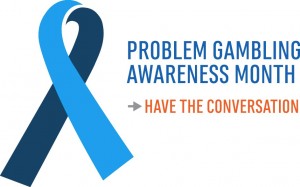The Massachusetts Gaming Commission Observes March 2016 as National Problem Gambling Awareness Month
- March 03, 2016
- by MGC Communications
- 0 comments
The Massachusetts Gaming Commission (MGC) announces its support and recognition of March 2016 as National Problem Gambling Awareness Month (NPGAM). NPGAM is a grassroots public awareness and outreach campaign established to bring awareness to issues associated with problem gambling and to also highlight the national and local resources available to provide individuals and families with support.
As part of MGC’s comprehensive efforts to address responsible gaming and problem gambling, MGC engaged a research team at UMass Amherst to oversee, evaluate and perform a multi-year, comprehensive research project on the economic and social impacts of the introduction of casino gambling in Massachusetts, with particular emphasis on at-risk and problem gambling. In June 2015, MGC in conjunction with the UMass research team released a population survey of nearly 10,000 Massachusetts adult residents and found a past-year prevalence of problem gambling is 1.7%. The study also found that an additional 7.5% of the population are at-risk gamblers. These percentages indicate that an estimated 67,500 to 109,100 people are suffering right now with a gambling problem and an additional 353,400 and 426,200 residents are considered at-risk gamblers.
MGC and partnering agencies, such as the Massachusetts Department of Public Health, will be able to use the information collected as part of the research agenda to make strategic, data-driven policy decisions based on a level of detail that has never previously been available in a gaming jurisdiction in the United States. As part of that continuous effort, MGC continues to work closely with its strategic partners to strengthen and increase problem gambling prevention and treatment options that are available.
“The Massachusetts Legislature created an innovative and forward-thinking approach in the gaming statute that addresses mitigation, prevention and funding in a way that has simply never been done before. The Expanded Gaming Act provides the opportunity to provide substantial funding to create a comprehensive public health strategy to effectively mitigate and prevent gambling-related harm.” said MGC Chairman Steve Crosby.
The Expanded Gaming Act directs significant resources from gaming revenue to a Public Health Trust Fund specifically intended to fund programs to prevent and mitigate problem gambling. The statute provides for a $15- to $20-million fund. When fully endowed, this will be one-third of all the money spent on problem gambling in the entire country.
MGC’s Director of Research and Responsible Gaming Mark Vander Linden said, “Massachusetts enjoys uniquely collaborative and supportive partnerships working toward a shared goal of preventing unintended negative consequences of gambling. I’d like to commend our partners for their focus and dedication as we implement innovative strategies and new resources to support prevention efforts.”
Lastly, MGC supports the Cambridge Health Alliance’s ‘Gambling Disorder Screening Day’. On March 8, 2016, the Cambridge Health Alliance’s Division on Addiction and Outpatient Addiction Services are sponsoring a Gambling Disorder Screening Day as part of the Cambridge Health Alliance Readiness for Gambling Expansion (CHARGE) Initiative. The Division is helping the Cambridge Health Alliance launch a pilot screening program at its Outpatient Addiction Service, Somerville, Massachusetts, as well as other organizations in Massachusetts and across the nation. For more information, please visit this website.
